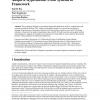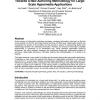109
click to vote
NRHM
2002
15 years 1 months ago
2002
In this article we claim that the linguistic-centred view within hypermedia systems needs refinement through a semiotic-based approach before real interoperation between media can...
121
click to vote
JUCS
2002
15 years 1 months ago
2002
: Design for All is an important challenge for hypermedia engineering. We analyze this challenge and show that it is necessary to find a way of describing partially designed hyperm...
114
click to vote
JUCS
2002
15 years 1 months ago
2002
: Different models and methodologies for the development of hypermedia systems and applications have emerged in the recent years. Software-technical methods and principles enriched...
116
click to vote
CSUR
1999
15 years 1 months ago
1999
: Researchers in the hypermedia field often lament that the World Wide Web does not support many of hypermedia's rich structuring, navigation and annotation features. What wou...
122
click to vote
CSUR
1999
15 years 1 months ago
1999
: Keeping multiple versions of the same electronic artifact is a necessity in many authoring fields, and a serious advantage in all of them. Hypermedia adds to that the issue of re...
117
click to vote
CSUR
1999
15 years 1 months ago
1999
: The navigational freedom in conventional hypermedia applications leads to comprehension and orientation problems [Nielsen 1990]. Adaptive hypermedia attempts to overcome these pr...
103
click to vote
RCC
2000
15 years 1 months ago
2000
Large-scale distributed hypermedia systems comprise a generation of powerful tools to meet the demands of the new information globalization era. The most promising of such systems...
118
click to vote
MTA
2000
15 years 1 months ago
2000
As the amount of information technology increases, managing information resources, so that the correct people can find the information easily, becomes a critical issue. Hypermedia...
104
click to vote
CE
2005
15 years 2 months ago
2005
This study examined the influence of cognitive style, spatial orientation and computer expertise on hypertext navigation patterns and learning outcomes when participants interacte...
119
click to vote
JNCA
2008
15 years 2 months ago
2008
Open hypermedia systems provide a decoupled approach to structural computing. This entails that the architecture of the systems are made up of user agents that communicate with di...


